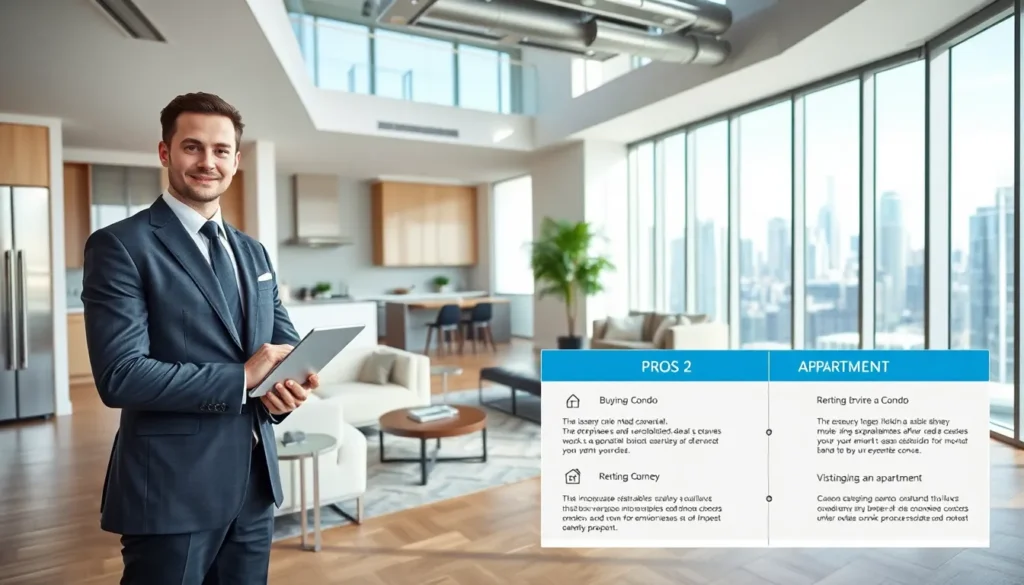Table of Contents
ToggleNavigating the world of real estate can feel overwhelming, like trying to solve a Rubik’s Cube blindfolded. The decision between buying a condo and renting an apartment isn’t just about four walls and a roof: it’s about lifestyle, investment, and all the little things in between. While one option invites financial commitment, the other offers freedom. Picture this: a world where you control your living space versus one where the landlord literally calls the shots. Intrigued? Let’s jump into the nitty-gritty of both options and arm you with the knowledge you need to make a savvy choice.
Understanding the Basics of Condos and Apartments

Condos and apartments may seem similar, but they each have unique aspects that play a significant role in the lifestyle of their residents.
Condos, short for condominiums, are individually owned units within a shared building or community. Owners have complete control over their living space, often customizing it to their liking. Plus, condo ownership frequently comes with shared amenities like pools, gyms, and communal gardens, fostering a sense of community.
On the other hand, apartments are typically rented from a property management company or landlord. Residents don’t own the unit and have limited control over alterations. But, this often means less responsibility for maintenance and repairs, which can be a major perk for those who prefer a more hands-off lifestyle.
When approaching the decision, it’s essential to know these key differences between condos and apartments to help shape your path forward.
Pros and Cons of Buying a Condo
Making the leap to buy a condo comes with a mix of excitement and apprehension. Let’s break down some pros and cons that can help smooth out the decision-making process.
Pros of Buying a Condo
- Equity Building: As the owner, each mortgage payment contributes to equity rather than just paying rent.
- Control and Customization: Homeowners can renovate and decorate their space as they wish, turning a four-walled unit into a personal paradise.
- Amenities Galore: Many condos come with appealing perks, such as fitness centers, rooftop lounges, and security services.
Cons of Buying a Condo
- Upfront Costs: The initial investment can be substantial, including down payments and closing costs.
- Monthly Fees: Besides the mortgage, homeowners must consider homeowner association (HOA) fees, which can add significant costs long-term.
- Market Fluctuations: Property values can fluctuate, meaning the investment might not always yield returns, especially in volatile markets.
Evaluating these aspects can help clarify whether condo ownership aligns with personal financial goals and lifestyle.
Pros and Cons of Renting an Apartment
Renting an apartment is often seen as the more flexible option. While ownership has its appeal, renting offers its own set of benefits and drawbacks.
Pros of Renting an Apartment
- Flexibility: Renters can relocate easily, making it ideal for those with uncertain career paths or in transitional life stages.
- Lower Responsibility: The landlord generally handles maintenance and repairs, freeing up tenants to focus on other matters.
- Cost Predictability: Monthly rent is usually fixed, with limited increases, allowing for a more predictable budgeting strategy.
Cons of Renting an Apartment
- No Equity Accumulation: Renters are pouring money into a space that doesn’t build personal wealth.
- Limited Customization: Personalizing a rental often comes with strict landlord guidelines, limiting creativity.
- Potentially Rising Rents: In popular areas, rent prices may skyrocket, causing budget concerns over time.
Given these factors, renters should weigh their current financial situation and future planning against the flexibility of renting.
Financial Considerations for Both Options
When it comes to finances, buying a condo and renting an apartment offer drastically different experiences.
Purchasing a Condo
- Mortgage Payments: Monthly payments go towards the property, building equity over time.
- Long-Term Investment: Although buying requires a hefty up-front investment, it can often be a wise long-term financial move.
- Maintenance Responsibilities: Homeowners must budget for repairs, property taxes, and HOA fees.
Renting an Apartment
- No Long-Term Commitment: Renting works better for those who may want to save for a future purchase or other investments.
- Up-Front Costs: Renters typically face lower initial costs, usually just first and last month’s rent and a security deposit.
- Lesser Variable Costs: While rent may increase, renters aren’t directly responsible for property taxes or heavy maintenance.
Understanding these financial implications is vital to determining which option aligns with individual financial goals.
Lifestyle Factors to Consider
The choice between buying a condo and renting an apartment also greatly influences lifestyle preferences.
- Stability vs. Flexibility: Condos cater to those seeking long-term stability in a community, while renting is perfect for those in transitional phases.
- Personalization Needs: If having a space tailored to personal taste is important, condos generally offer more freedom.
- Social Environment: Those who thrive in vibrant communities may find the shared amenities of condos appealing, while apartment complexes often provide more anonymity.
Deciding which lifestyle fits best plays a crucial role in choosing between these living arrangements.
Long-Term vs Short-Term Commitment
Understanding the commitment level behind buying versus renting can shape long-term life goals.
Long-Term Commitment in Buying
Buying a condo is a significant commitment, homeowners often feel tied to a single location and take on financial responsibilities. It’s a good option for individuals looking to settle down and invest in a community.
Short-Term Flexibility in Renting
Renting an apartment allows tenants to adapt swiftly to changing life circumstances, be it job changes, personal preferences, or even exploring new neighborhoods. Individuals can try out different living situations without heavy financial implications.
In the end, choosing the right commitment approach can significantly impact life experiences.
Making the Right Decision for Your Situation
Choosing between buying a condo and renting an apartment isn’t a one-size-fits-all scenario. Here are some guiding questions to consider:
- What is your current financial situation? Evaluate available savings, income stability, and how much one can comfortably afford in monthly payments.
- What is your lifestyle preference? Reflect on how lifestyle needs fit with either option, such as community engagement or personalization desires.
- What are your long-term goals? Think about where one sees themselves in five or ten years, owning or renting can both offer unique pathways toward future achievements.
Eventually, the right choice hinges on individual preferences, values, and goals.



